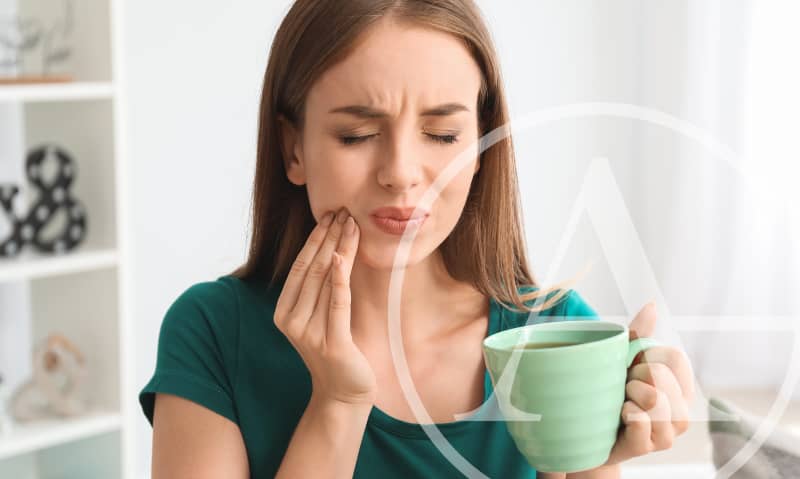From Cavities to Bruxism: 7 Things Your Tooth Pain Could Be Telling You

What’s causing your tooth pain?
Generally, you shouldn’t ignore pain. Whether it be a random pain, something that comes and goes, or a consistent throbbing, your body is trying to tell you something. It’s no different when it comes to tooth pain. If you have a toothache, it could be an indicator of a cavity, bruxism, or something else that your dentist should treat. Toothaches can keep you from getting a good night’s sleep and prevent you from staying focused during the day. Read on to learn more about the most common tooth pain causes and what you should do about them.
There are many causes of tooth pain, some more serious than others. When tooth pain occurs, it’s always wise to contact your dentist to determine the best treatment plan and how to prevent the issue from recurring.
Here are seven of the most common causes of tooth pain.
1. Tooth Decay
Tooth decay leads to cavities. A cavity is a hole in a tooth that results from tooth decay. Cavities occur when the acid in your mouth wears down your enamel. Brushing your teeth twice a day, flossing at least once daily, and visiting your dentist every six months for a professional dental cleaning is the best way to prevent tooth decay.
2. Bruxism
As the Mayo Clinic explains, bruxism occurs when you “grind, gnash, or clench your teeth.” The ailment most commonly affects patients who are nervous, anxious, frustrated, or stressed. Treating bruxism with a nightguard keeps the upper and lower teeth from coming into contact. Occasionally, your doctor or dentist may also recommend practicing relaxation or meditation techniques.
3. Gum Disease
In the earliest stages of gum disease, referred to as gingivitis, the patient will experience tender, bleeding gums. However, it is not until gum disease progresses to its more severe stage, periodontitis, that the infection spreads to the jaw bone and connective tissues that support the teeth. This inflammation can cause what feels much like a toothache. The best way to prevent gum disease is the same as preventing tooth decay: brushing twice a day, flossing daily, and visiting your dentist every six months.
4. Tooth Sensitivity
When the underlying layer of your teeth, the dentin, becomes exposed, it can cause tooth sensitivity. This can be due to a number of factors, including dental decay, gum disease, or general enamel wear. Most people who experience tooth sensitivity feel it when they consume extremely hot or cold beverages or foods. Exposure to cold outside air can cause sensitivity as well. If you are experiencing dental sensitivity, your dentist will likely recommend a desensitizing toothpaste, fluoride treatment, or a gum graft depending on its underlying cause.
5. Damaged Filling
Dentists use fillings to restore cavities in your teeth. A filling ensures that bacteria is removed and the cavity doesn’t progress. But occasionally, fillings can become damaged. Over time, eating hard foods can place excess stress on the teeth and cause damage to your dental filling, despite how careful you may be. If your filling is damaged, it re-exposes the area that the filling was intended to correct. This can cause a toothache, and the only way to treat it is by making a trip to your dentist to replace it.
6. Dental Trauma
Experiencing a blow to the face via an accident, sports injury, or otherwise can cause damage to the nerve, soft internal pulp, or root structure of your tooth. Though sometimes these accidents cause little aesthetic changes to the tooth, the inflammation that occurs over the next couple of days can be extremely uncomfortable. If you have experienced any type of dental trauma, you should see your dentist for an evaluation. Though you might not see the damage now, internal damage can appear later. Early treatment can help save your tooth and prevent long-term damage.
7. Tooth Abscess
A tooth abscess is an infection in or around a tooth that can lead to a dangerous situation. Infections in your tooth can lead to infections of the sinus cavity, and an abscess can turn into sepsis, a life-threatening condition that spreads throughout the body. Signs of an abscess may include throbbing or constant pain, discomfort from hot and cold temperatures, and pain from biting pressure. If you have an abscess, you should consider it a dental emergency and seek treatment from your dentist immediately.
Avoid tooth pain causes with regular visits to your nearest Park Cities dentist.
The best way to avoid a toothache in the first place is by practicing good oral hygiene and paying a visit to your dentist every six months. If you are experiencing tooth pain, head to your dentist near Highland Park and University Park, Texas. The Dallas Cosmetic Dental team can help treat your toothache so that you can feel better and return to your daily life. Request an appointment today.